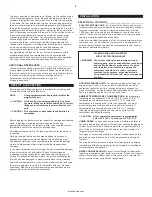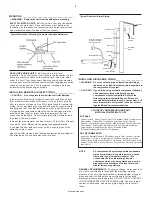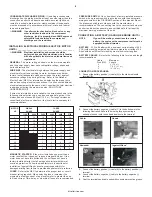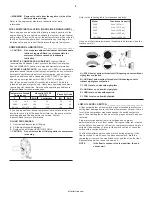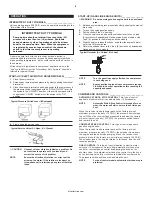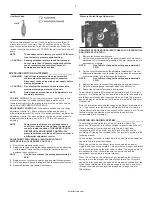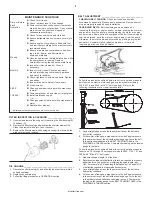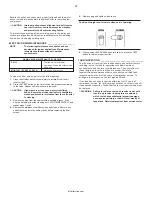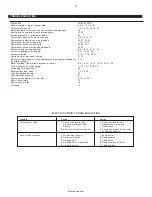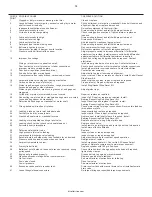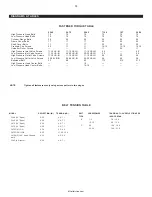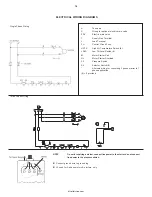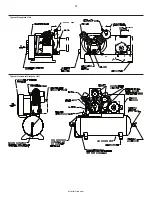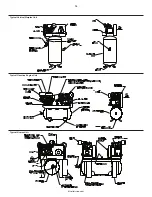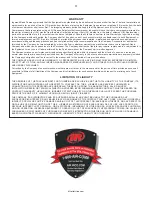
•
WARNING
Remove the cable from the negative (-) side of the
battery before servicing.
Refer to the engine manufacturer’s instructions for more
information.
FUEL PUMP INSTALLATION (GASOLINE ENGINE UNITS) _
Some engines use an optional fuel pump to supply gasoline to the
engine directly from a vehicle’s onboard fuel system. Install the fuel
pump within 12 inches (30 cm) of the bottom surface of the vehicle’s
fuel tank. Protect the pump from contamination by installing a fuel
isolation valve and an inline filter between the pump fuel system.
COMPRESSOR LUBRICATION _________________________
•
CAUTION
Do not operate without lubricant or with inadequate
lubricant. Ingersoll-Rand is not responsible for
compressor failure caused by inadequate
lubrication.
SYNTHETIC COMPRESSOR LUBRICANT. Ingersoll-Rand
recommends All Season Select synthetic lubricant from start-up.
See the WARRANTY section for extended warranty information.
ALTERNATE LUBRICANTS. You may use XL-300 or a comparable
petroleum-based lubricant that is premium quality, does not contain
detergents, contains only anti-rust, anti-oxidation, and anti-foam
agents as additives, has a flashpoint of 440°F (227°C) or higher,
and has an auto-ignition point of 650°F (343°C) or higher.
See the petroleum lubricant viscosity table below. The table is
intended as a general guide only. Heavy duty operating conditions
require heavier viscosities. Refer specific operating conditions to
Ingersoll-Rand for recommendations.
Temperature Around
Compressor
Viscosity @ 100°F
(37.8°C)
Viscosity Grade
°F
°C
SUS
Centistokes
ISO
SAE
< 40
< 4.4
150
32
32
10
40-80
4.4-26.7
500
110
100
30
80-125
26.7-51.0
750
165
150
40
If you use a petroleum-based compressor lubricant at start-up and
decide to convert to All Season Select later on, the pump must be
decarbonized and flushed before conversion. Contact
Ingersoll-Rand for more information.
FILLING PROCEDURES:
1.
Unscrew and remove the oil fill plug.
2.
Fill the crankcase with lubricant.
3.
Replace the oil fill plug HAND TIGHT ONLY.
•
CAUTION
Do not remove the oil fill plug while the compressor
is running.
Refer to the following table for crankcase capacity.
Model
Crankcase Capacity
2340
28 oz. (827 ml.)
2475
41 oz. (1212 ml.)
2545
73 oz. (2158 ml.)
7100
80 oz. (2365 ml.)
15T, 3000
144 oz. (4258 ml.)
Use one of the following methods illustrated to determine when the
crankcase is full.
LOW OIL LEVEL SWITCH _____________________________
A float activated low oil level switch may be installed to protect your
unit against damage due to insufficient compressor oil level. Low oil
level in the compressor crankcase causes the switch contacts to
open, thus shutting the unit down until the proper oil level has been
restored.
Proper protection against low oil level depends on proper
adjustment of the low oil level switch. During the initial run, stop the
unit and drain one quart of oil from the compressor crankcase into a
suitable clean container. Listen for the switch to click or check the
switch with a continuity tester.
The float sometimes gets cocked or stuck during shipping. If the
float is cocked or stuck, open the disconnect switch, drain the
remaining oil, remove the crankcase cover and then free the float.
Reassemble and then reuse the same oil.
NOTE
If the float is cocked in the low position, the unit
cannot start.
5
A = FULL level at bottom thread of oil fill opening on units without
sight glass or dipstick.
B = ADD level below bottom thread of oil fill opening on units
without sight glass or dipstick.
C = FULL level on units with sight glass.
D = ADD level on units with sight glass.
E = ADD level on units with dipstick.
F = FULL level on units with dipstick.
http://air.irco.com


